
Aging-US
Scope & Guideline
Elevating Conversations in Aging and Cell Biology
Introduction
Aims and Scopes
- Molecular and Cellular Mechanisms of Aging:
Research on the underlying biological processes that contribute to aging, including cellular senescence, oxidative stress, autophagy, and epigenetic modifications. - Age-Related Diseases:
Studies focusing on various diseases associated with aging, such as Alzheimer's disease, cardiovascular diseases, cancer, and metabolic disorders, highlighting their pathophysiology and potential therapeutic interventions. - Impact of Lifestyle and Environmental Factors:
Exploration of how diet, physical activity, and environmental exposures influence aging and the onset of age-related diseases. - Innovative Therapeutic Approaches:
Development and evaluation of new therapeutic strategies, including pharmacological agents, lifestyle interventions, and regenerative medicine techniques aimed at promoting healthy aging. - Biomarkers of Aging:
Identification and validation of biomarkers that can predict biological age, disease risk, and therapeutic responses in aging populations. - Genetic and Epigenetic Influences:
Investigation into the genetic and epigenetic factors that affect aging processes and contribute to the variability in aging among individuals.
Trending and Emerging
- Longevity and Anti-Aging Interventions:
Increased focus on lifestyle interventions, dietary restrictions, and pharmacological agents that target aging processes to extend lifespan and healthspan. - Immunoaging and Inflammation:
Growing interest in how aging affects immune function and the role of inflammation in age-related diseases, leading to research on immunotherapies and anti-inflammatory strategies. - Epigenetics of Aging:
Emerging studies on how epigenetic modifications influence aging processes, with implications for biomarkers and therapeutic targets. - Microbiome and Aging:
Research exploring the relationship between gut microbiota and aging, including how microbiome composition affects health outcomes in older adults. - Artificial Intelligence in Aging Research:
Utilization of AI and machine learning techniques to analyze aging data, predict outcomes, and personalize interventions in aging populations. - Targeting Cellular Senescence:
Increased emphasis on understanding and targeting cellular senescence as a therapeutic strategy to mitigate age-related decline and diseases.
Declining or Waning
- Traditional Herbal Remedies:
Research focusing on traditional herbal treatments for aging and age-related diseases has decreased, as the field shifts towards more molecular and pharmacological approaches. - Basic Descriptive Studies:
There has been a decline in purely descriptive studies that do not incorporate mechanistic insights or translational aspects, reflecting a trend towards more hypothesis-driven research. - Non-Specific Aging Models:
The use of non-specific or generalized aging models in research is waning, with a preference for more targeted and disease-specific models that offer clearer insights into aging mechanisms.
Similar Journals
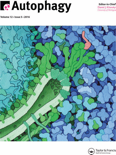
Autophagy
Bridging Fundamental Discoveries with Clinical InsightsAutophagy is a premier peer-reviewed journal published by Taylor & Francis, Inc. in the United States, focusing on advances in the fields of Cell Biology and Molecular Biology. With an impressive impact factor reflected in its Q1 ranking in both categories, Autophagy stands as a vital resource for researchers and professionals dedicated to understanding the intricate mechanisms of cellular degradation and recycling. The journal has been a cornerstone of scientific communication since its inception in 2005, continuing to flourish through 2024, fostering collaboration and innovation in the study of autophagic processes. Although it does not currently offer Open Access options, the journal remains highly regarded for its rigorous peer-review process and its commitment to publishing high-quality, impactful research. By bridging fundamental research with clinical applications, Autophagy plays a crucial role in advancing our understanding of various diseases, making it an essential tool for scholars and practitioners in the biomedical field.
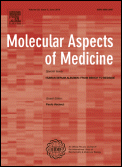
MOLECULAR ASPECTS OF MEDICINE
Bridging the Gap Between Biochemistry and MedicineMOLECULAR ASPECTS OF MEDICINE is a premier journal published by Elsevier, focusing on groundbreaking research in the fields of biochemistry, molecular biology, and medicine. With an impressive impact factor and ranking within the top quartile across multiple categories, including Q1 in Biochemistry, Clinical Biochemistry, and Molecular Medicine, it serves as an essential platform for sharing innovative findings that advance our understanding of molecular mechanisms in health and disease. The journal, which has been in publication since 1976, provides a diverse range of articles, addressing both fundamental and applied aspects of molecular medicine, thus appealing to a broad audience of researchers, professionals, and students. While MOLECULAR ASPECTS OF MEDICINE does not currently offer Open Access options, it remains a vital resource for accessing high-quality, peer-reviewed scholarly works that significantly contribute to the advancement of biomedical research.

CELL CYCLE
Unveiling the Secrets of Cellular Mechanisms.CELL CYCLE, an esteemed journal published by Taylor & Francis Inc., stands at the forefront of biological research, focusing on the intricate mechanisms of cell proliferation, molecular biology, and developmental biology. With an ISSN of 1538-4101 and an E-ISSN of 1551-4005, this journal has established its influence in the field with a commendable impact factor reflecting its rigorous peer-review process and high-quality publications. Notably, in 2023, it achieved a Q1 ranking in Medicine (miscellaneous) and a Q2 ranking in both Cell Biology and Developmental Biology, marking its vital role in advancing scientific understanding and innovation. Operating within a converged framework from 2002 to 2024, CELL CYCLE caters to a diverse audience of researchers, professionals, and students eager to explore contemporary findings and emerging trends. The journal's objective is to disseminate groundbreaking research that enhances our understanding of cellular mechanisms, fostering collaboration and innovation. Although not an open-access journal, it remains a premier source for those engaged in cell cycle research, and its contributions have significant implications for fields such as healthcare, biotechnology, and genetics.
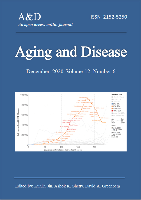
Aging and Disease
Bridging research and practice in geriatric health.Aging and Disease is a leading open-access journal published by the International Society on Aging and Disease, dedicated to advancing the understanding of aging and its associated diseases. Since its inception in 2010, the journal has established itself as a vital resource for researchers and practitioners in the fields of Geriatrics, Neurology, Cell Biology, and Pathology. With an impressive Q1 ranking across multiple categories and a robust position in Scopus rankings, including ranks in the top 3% in Geriatrics and Gerontology, it showcases high-quality research that addresses the complexities of aging processes. Each issue presents original articles, reviews, and insights aimed at improving health outcomes for the aging population. The open-access model ensures that valuable research findings are readily available to a global audience, fostering collaboration and innovation. As a go-to publication for scholars, healthcare professionals, and students, Aging and Disease significantly contributes to the multidisciplinary dialogue surrounding aging and its health implications.

JOURNALS OF GERONTOLOGY SERIES A-BIOLOGICAL SCIENCES AND MEDICAL SCIENCES
Advancing the Science of Aging for Healthier FuturesJournals of Gerontology Series A: Biological Sciences and Medical Sciences, published by Oxford University Press Inc, stands at the forefront of aging research, bridging the gap between biological sciences and medical practices to address the complexities of gerontology. With an impressive impact factor reflecting its significant contribution to the field, this journal is recognized within the Q2 quartile in Aging and the Q1 quartile in Geriatrics and Gerontology for 2023, evidencing its high-quality scholarship and relevance. Researchers and professionals will find valuable insights through its comprehensive coverage of aging-related topics, informed by cutting-edge studies ranked among the top in their category—Rank #11 in Geriatrics and Gerontology and Rank #9 in Aging on Scopus. The journal aims to disseminate innovative research that can impact health care practices and enhance the quality of life in older populations. For those engaged in studies of aging, this journal offers a vital platform for sharing knowledge and advancing the understanding of biological and medical sciences as they pertain to gerontology.

Frontiers in Aging
Pioneering Insights into the Aging ProcessFrontiers in Aging is a leading academic journal published by FRONTIERS MEDIA SA, dedicated to advancing the understanding of the biological processes associated with aging. Established in 2020, this open-access journal aims to bridge the gap between various disciplines including genetics, molecular biology, and physiology, providing a multidisciplinary platform for researchers and clinicians alike. With a notable impact factor denoted by its Q2 quartile rankings in Aging, Genetics, and Molecular Biology, and a Q1 ranking in Physiology as of 2023, the journal is recognized for its contribution to the scientific community. Located in Lausanne, Switzerland, it is committed to promoting open discourse and publishing cutting-edge studies that address the complexities of aging and its implications for health and longevity. The journal’s editorial board, consisting of leading experts, ensures the rigorous peer-review process, maintaining high academic standards and fostering innovation in aging research.

REJUVENATION RESEARCH
Unlocking the Secrets of Lifelong VitalityRejuvenation Research is a premier journal dedicated to the advancing field of gerontology and aging research, published by Mary Ann Liebert, Inc. Established in 2000, the journal serves as a pivotal platform for the dissemination of scholarly articles that explore the complex mechanisms of aging and innovative approaches to rejuvenation. With an impact factor reflective of its robust scholarly contributions, the journal currently holds a Q4 ranking in Aging and a Q3 ranking in Geriatrics and Gerontology, showcasing its relevance in the academic community. This periodic publication, welcoming open access submissions, invites researchers, professionals, and students alike to engage with cutting-edge findings that could shape future geriatric practices and enhance quality of life. The journal underscores the importance of interdisciplinary collaboration, encouraging explorations that intersect with biochemistry, genetics, and other vital areas of study. Through its ongoing commitment to high-quality research, Rejuvenation Research remains a critical resource for understanding the biological underpinnings of aging and the strategies to mitigate its effects.

Epigenomes
Connecting Science and Discovery in EpigenomicsEpigenomes is a distinguished open access journal published by MDPI, dedicated to advancing the field of epigenetics and its interdisciplinary connections to biochemistry, genetics, and molecular biology. Since its inception in 2017, this journal has provided a transparent platform for researchers to share their findings, contributing to a deeper understanding of epigenetic mechanisms and their implications in health, toxicology, and mutagenesis. Ranked in the Q2 quartile across multiple categories, including biochemistry and genetics, Epigenomes is recognized for its scholarly contributions, reflected in its notable Scopus rankings. Readers benefit from a wealth of open access articles, fostering innovation and collaboration within the academic community. With its headquarters in Switzerland and an unwavering commitment to scientific rigor, Epigenomes is positioned as a vital resource for researchers, professionals, and students seeking to deepen their insights into the epigenomic landscape.
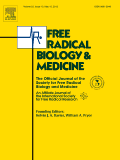
FREE RADICAL BIOLOGY AND MEDICINE
Exploring the Dynamics of Free Radicals in Health and DiseaseFREE RADICAL BIOLOGY AND MEDICINE, published by Elsevier Science Inc, is a premier journal dedicated to the field of biochemistry and medical physiology. With an ISSN of 0891-5849 and an E-ISSN of 1873-4596, this journal stands out with its impressive ranking in the 2023 category quartiles: Q1 in Biochemistry and Q1 in Physiology (medical). Specifically, it has achieved a remarkable position of 29th out of 438 in Biochemistry and 8th out of 113 in Physiology, placing it firmly in the 93rd percentile of its field, as per Scopus rankings. Since its inception in 1987, the journal has focused on advancing the understanding of free radicals and their role in biological processes, encompassing a wide range of topics from oxidative stress to therapeutic applications. Although it does not currently offer open access, the journal's rigorous peer-review process and impactful research ensure that it remains a valuable resource for researchers and professionals seeking to explore the intricate relationships between free radicals and health. The journal's headquarters are located at STE 800, 230 Park Ave, New York, NY 10169, reflecting its esteemed place within the scientific community and commitment to high-quality research.
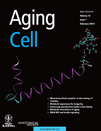
AGING CELL
Exploring the Frontiers of Aging ResearchAGING CELL is a premier peer-reviewed journal published by Wiley, specializing in the rapidly evolving field of aging research and cell biology. Established in 2002 and enjoying an impressive track record as evidenced by its Q1 ranking in both Aging and Cell Biology categories for 2023, the journal has become a vital resource for researchers and professionals alike. With a significant impact factor highlighting its scholarly influence, AGING CELL offers an open access model since 2014, ensuring that groundbreaking research is accessible to the global community. The journal covers a wide array of topics related to the mechanisms of aging at the cellular and molecular levels, making it essential reading for anyone invested in understanding the complexities of aging processes and their implications for health and disease. With a broad international readership based in the United Kingdom and beyond, AGING CELL is dedicated to disseminating high-quality research that impacts scientific understanding and fosters advances in the field.